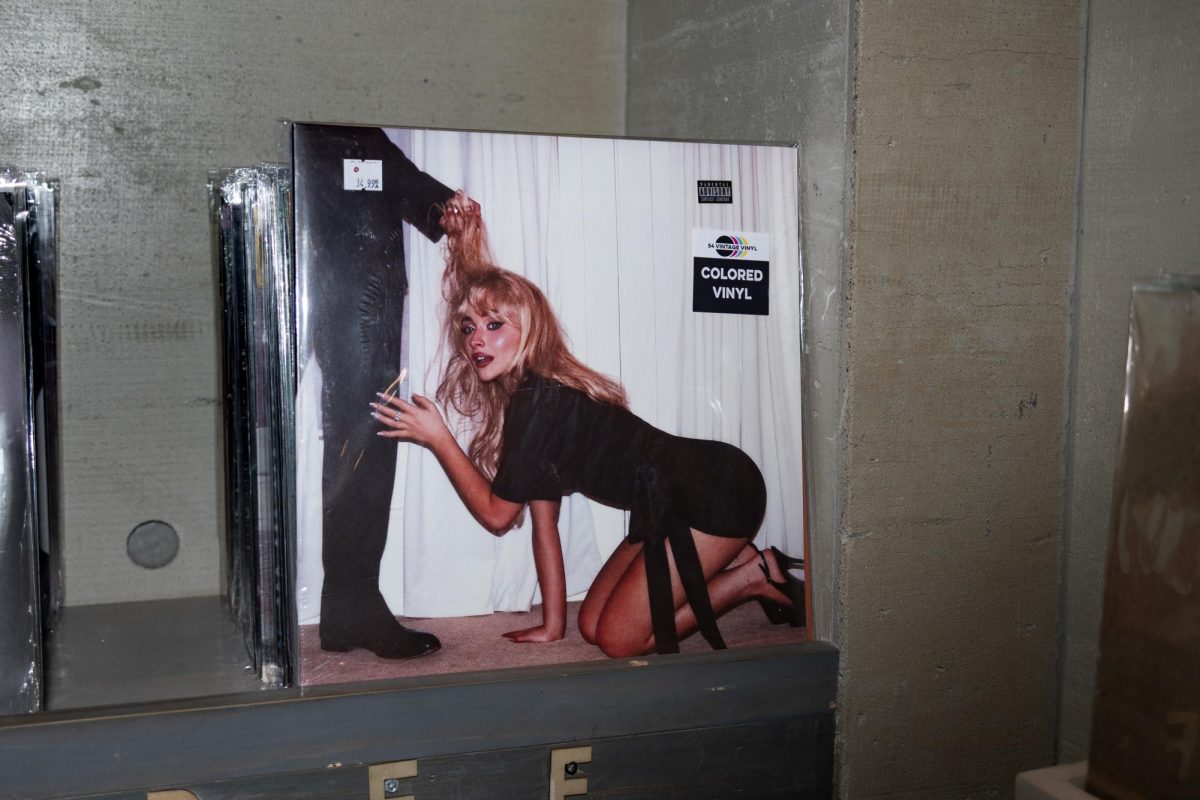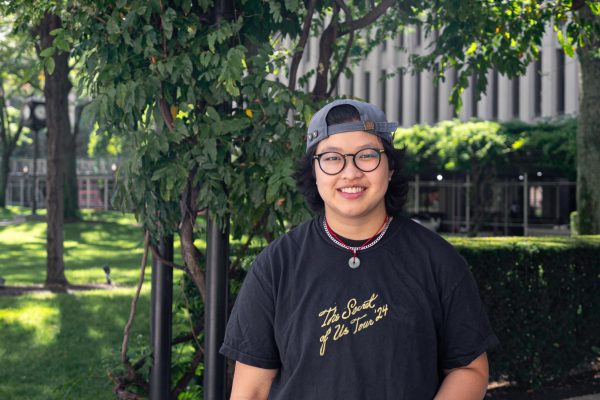When Sabrina Carpenter dropped “Man’s Best Friend” on Aug. 29, the internet “Couldn’t Make It Any Harder” to decide whether the album was a bop or a flop.
Carpenter’s seventh studio album sparked controversy earlier this summer over its cover art, which shows the two-time Grammy Award winner on her knees while a man holds her hair as if it were a leash. Some called this an outright objectification of women, while others, including Carpenter herself, claim it’s a metaphor for submission and control rather than sexual exploitation.
Now with all 12 songs available to listen to, the cover seems like a false teaser. At first glance, viewers might assume that the album will be sexualizing and provocative, but listening to the music reveals that Carpenter is instead critiquing the ways women are sexualized and asserting control over her own image through playful lyrics.
The underlying theme of the album is that she only submits when treated with respect and care, emphasizing healthy, consensual intimacy. Laden with her signature wit and innuendos, Carpenter refuses to tolerate toxic behavior, proving that her intention was never to portray female degradation.
The backlash reinforced Carpenter’s scrutiny of gender stereotypes, assuring that the conversation began before even hitting play on the album.
The question on everyone’s lips: Is Carpenter sexy or sexist? Her goal seems not to be convincing her audience of either, but to make them question gender roles and power. Carpenter’s efforts also confront the influence of political and social conservatism, which continues to shape women’s sexuality and independence, and fuel criticism. She presented the album cover as an intentional subversion of the album’s themes rather than an obvious statement. The backlash reinforced Carpenter’s scrutiny of gender stereotypes, assuring that the conversation began before even hitting play on the album.
Carpenter proves her motive for the album by splitting her songs into two main concepts, one in which she asserts dominance and one in which she is left rejected and lonely.
Songs like “Sugar Talking” and “Tears” show a side of her where she is aroused not by the physicality of a man, but instead by the thought of him being the ideal partner and acting right.
She’s a woman who knows what she wants: passion and loyalty.
In “Sugar Talking,” Carpenter chooses to be assertive rather than submitting to a man’s foolish acts. She knows her self-worth, and she reads right through the sweet talk. She challenges gender norms through her lyrics and takes pleasure in seeing “him” carrying out a domestic role traditionally expected of women. A similar theme occurs in “Tears” when she sings:
“Baby, just do the dishes, I’ll give you what you, what you want.”
“Don’t Worry, I’ll Make You Worry” focuses on Carpenter’s power over a man, letting her emotionally manipulate him while maintaining her dignity. The track radiates her confidence and celebrates her empowered femininity in a male-dominated society.
Carpenter then takes a more vulnerable approach with some of her songs. She expresses the feeling of the honeymoon phase of a relationship being over. Songs such as “My Man on Willpower,” “Nobody’s Son” and “Never Getting Laid” center around the reality of rejection and the feeling of no longer being desired, with lyrics like:
“He used to be literally obsessed with me / I’m suddenly the least sought out girl in the world,” (“My Man on Willpower”).
Incorporating lyrics that are simultaneously catchy and relatable draws more viewers in, giving them a sense of comfort and confidence.
After heartbreak, Carpenter turns into a more exuberant kind of relatability with “Go Go Juice.” This song is about being broken up with and drunk dialing several love interests, both past and present. She showcases her self-deprecating sense of humor, revealing names that rhyme with her exes.
“I’m just drinking to call someone / Ain’t nobody’s safe when I’m a little drunk / Could be John or Larry, gosh, who’s to say? / Or the one that rhymes with ‘villain’ if I’m feelin’ that way.”
While the cover might have stirred some commotion in the media, the music behind it carries a lot more meaning than anticipated.
These lyrics went viral as fans decoded who Carpenter was hinting at. Results? “John” for Shawn Mendes, “Larry” for Barry Keoghan, “gosh” for Joshua Basset and last but not least, “villain” for Dylan O’Brien.
“Man’s Best Friend” is a true display of Carpenter’s progress in the music industry. Her songwriting has improved noticeably throughout her albums, and the production has become layered, employing lively instrumentals that reveal her frisky and authoritative vocals.
While the cover might have stirred some commotion in the media, the music behind it carries a lot more meaning than anticipated. Some may still argue that “Man’s Best Friend” is too much, but a bold artist will always have the loudest critics.



Z.Z. • Sep 10, 2025 at 11:12 pm
This writer did an incredible job capturing both the controversy and the deeper meaning behind the album, offering thoughtful insight while keeping the review engaging and fair.